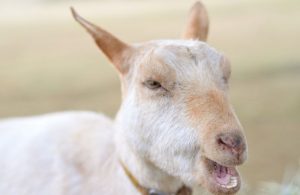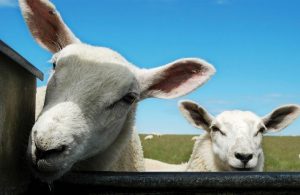Why is Your Sheep Bleating?
Since animals don’t use words to communicate, it can be difficult to understand what they’re trying to tell us. If you’re a sheep owner, learning how sheep communicate can help you have a better understanding of what they need when they try to tell you something. One way sheep communicate is by bleating.
So, why is your sheep bleating so much? There are a few different reasons why your sheep may bleat continuously; here is a list of common reasons why sheep bleat:
- Young sheep bleat when they are underfed and hungry
- Sheep will bleat if they are separated from their flock
- Sheep will bleat if anxious or unsure of something
- Sheep may bleat in anticipation at feeding time
- Rams may bleat to attract a ewe during mating season
If you notice your sheep demonstrating unusual behavior, being able to understand their communication can help you identify the problem quickly and take the necessary actions. To learn more about why sheep bleat, keep reading!
Young Sheep Bleat When They Are Underfed and Hungry
While adult sheep get their sustenance from forage in the pasture, lambs rely on their mother’s milk. Lambs nurse at least every four hours, and more frequently if they are newborn. As they start to feel hungry, they may bleat to let their mother know.
If you find that a lamb is excessively and consistently bleating, they may be underfed. If a lamb is underfed, it can be a sign of an underlying health condition with the ewe that produced the lamb. The ewe may not be producing enough milk, refusing to nurse, or may have Mastitis, a bacterial infection in the udder. Either way, if you notice a lamb bleating continuously, you should check on the mother for any health problems.
If the mother isn’t producing enough milk, you’ll need to bottle-feed the lamb. You can use milk-based powdered milk, pasteurized whole cow milk, and even goat’s milk. If you have to bottle-feed lambs, you should expect to feed them between 2-4 times each day and night depending on how old the lamb is. Younger lambs will need to be bottle-fed more frequently but with smaller doses, while older lambs will usually need to be fed twice a day and consume about 20 ounces each time.
Sheep Bleat When They Are Separated From Their Flock
 Sheep communicate with each other by making many different types of sounds. They may “baa” at each other to signal their location and to let the others know where they are. For this reason, a lost sheep or a sheep that has been removed from its flock may bleat excessively.
Sheep communicate with each other by making many different types of sounds. They may “baa” at each other to signal their location and to let the others know where they are. For this reason, a lost sheep or a sheep that has been removed from its flock may bleat excessively.
Sheep will usually need to be removed from their flock if they have an illness or a parasite infestation, as they could be contagious and spread it to the other sheep. Many people keep sick sheep isolated in a comfortable environment where they can be monitored until they recover. While it isn’t ideal to remove a sheep from its flock, it’s a vital step in keeping the rest of your flock healthy. Did you know that sheep can get fleas? You can treat fleas on sheep much like you would treat fleas on goats. To learn more, check out our article Do Goats Get Fleas? Essential Goat Care.
Sheep are prey animals, so they live in a flock for extra protection and safety. When removed or lost from their flock, they feel more vulnerable to danger. To them, it’s vital that they get back to their friends. They will bleat to try and get a response from their flock and find where the other sheep are.
Sheep Bleat If They Are Anxious or Unsure of Something
Another reason sheep may bleat when they’re separated from their flock is because they feel anxious. They’re more vulnerable to predators and they don’t have other sheep watching their backs. Sheep may also get stressed when there are new animals or foreign objects and when there is unusual commotion around their pasture.
I’ve seen goats bleat when dogs came around their pasture or even when someone was weed-eating in the distance. The sheep are trying to determine whether they are in danger or whether they need to be prepared to flee. As prey animals, sheep can become anxious and stressed quickly if they are in situations where they sense a threat. The adrenaline of flight can cause sheep to become anxious and on edge.
Sheep May Bleat in Anticipation at Feeding Time
Sheep that live out in an adequate pasture can graze as they see fit, so they don’t usually experience hunger. However, if you have sheep that are living in a corral or a barn and rely on humans to feed them throughout the day, they will bleat as it gets close to feeding time. Much like young lambs, the sheep in this situation will bleat to let you know they are getting hungry.
Sheep kept in a pen will usually eat hay and grain. One sheep can eat up to 3% of its body weight per day, so it’s vital to provide them with adequate sustenance. Most people feed their sheep twice a day, once in the morning and once in the evening. While hay can provide the consistent forage that sheep rely on, grain can provide extra nutrients and fats to balance your sheep’s diet. Before you start keeping sheep in a pen, you should research and plan an adequate diet for your sheep.
Rams May Bleat to Attract a Ewe During Mating Season
Another instance you may hear a sheep bleating is when a ram is attempting to attract a ewe for mating. Rams will baa and making a rumbling sound to let a ewe know that they are interested. While sheep breeding season is typically between October and November, ewes come into heat about every 16 days. Rams will become particularly frisky at this time and will need a way to attract a mate.
Other Ways Sheep Communicate
Bleating is just one of the many ways sheep will communicate. Since sheep can’t talk, they have to use other methods of communication. Sheep will largely use body language to communicate with each other and with humans. Here is a list of body language you sheep will use:
- Ears flat and head up to threaten
- Kicking to tell others to get back
- Lowering the head and charging to establish dominance
- Wagging their tails show pleasure or happiness
- Tightness in the face signals pain
- Ears forward show attentiveness
- Relaxed face and eyes show a content sheep
As you can see, there are many other ways sheep will communicate! Being able to read your sheep’s body language can help you understand what they are trying to tell you and what they need.
Sheep are very expressive animals! I’ve seen sheep that run up to you and wag their tails when they want attention, which are very similar characteristics to a dog. There have been many ongoing studies done on sheep behavior and how they feel and express things.
Frequently Asked Questions
Can Sheep Get Depressed?
Sheep are often known to get depressed when isolated from their flocks. Depression can cause your sheep to not eat or drink and to seem lethargic. For this reason, if you have to isolate a sheep, you should at least place them in an area where they can see their flock. A sheep that seems depressed can also be a sign of underlying health conditions, so it’s something to take seriously.
Do Sheep Get Lonely?
As herd animals, sheep can get lonely if they aren’t around sheep or a flock setting. Sheep are prey animals and rely on a flock to provide them with extra protection and security. Studies show that sheep also form bonds with the other sheep in their flock, meaning that they are very social creatures. As a good rule of thumb, you should have at least five sheep to provide a flock setting. You can also keep sheep with other livestock like cows, goats, and alpacas. To learn more, check out my article Can You Keep a Sheep By Itself? Essential Guide.
Can Lambs Live In Your House?
While it’s not unheard of to keep lambs in your house, there are many cons to this. It is nearly impossible to potty-train sheep, so your house could be a mess if you have sheep living inside. Secondly, if a sheep lives too long in a home, it can be more difficult to integrate them into a flock or have them live outside. Many people will take orphaned or neglected lambs and raise them in their house until the lamb reaches weaning age, which is about 60 days old. At weaning age, the lambs are returned to the flock so they can learn to be sheep.
I hope this article helped answer your questions about why your sheep may be bleating. We have many articles about caring for your livestock and poultry; check out the articles below!


